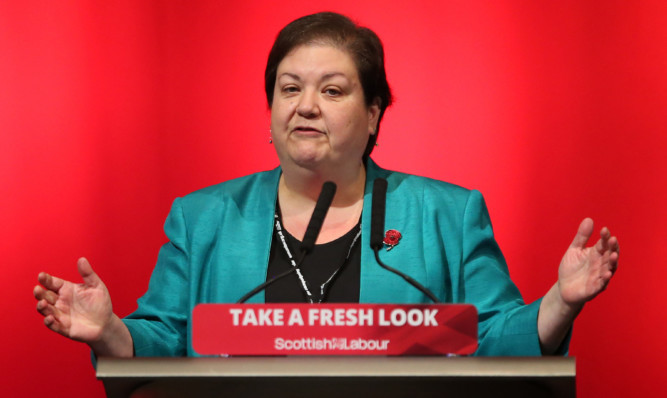A senior Scottish Labour MSP has defied the party’s new stance on scrapping Trident in a vote at Holyrood.
Jackie Baillie was the only Labour member to vote against a call to reject renewal of the weapons system based at Faslane on the Clyde.
MSPs voted 96 to 17 in favour of a Scottish Government motion, amended by Scottish Labour, urging the UK Government to cancel plans for renewal and commit to a defence diversification strategy to protect defence workers’ jobs.
Ms Baillie, whose Dumbarton constituency includes the Faslane naval base, said about 13,000 jobs could be affected.
“Faslane is the single biggest site employer in Scotland,” she said.
“More than a quarter of West Dunbartonshire’s full-time workforce are employed there in good-quality well-paid jobs.
“The SNP don’t want to talk about jobs, (there is) not one mention of jobs in their motion today.
“The SNP are all about gesture politics, no concern for the workers, only for their position in the polls.”
Ms Baillie’s Scottish Labour colleagues joined SNP members in calling for Trident to be scrapped, alongside Scottish Green and independent MSPs.For more on this story see Wednesday’s CourierThe Conservatives and the Liberal Democrats opposed the motion.
The Holyrood debate on the issue came just 48 hours after the Scottish Labour conference in Perth overwhelmingly voted against renewing Trident, putting policy north of the border at odds with the UK party’s position.
The decision means UK leader Jeremy Corbyn and Scottish Labour leader Kezia Dugdale have different views from each other and from their own parties.
While Labour’s position continues to be to support the continuation of Trident, Mr Corbyn is firmly against nuclear weapons. Meanwhile, Ms Dugdale supports multilateral disarmament, even though 70% of votes at the conference were in favour of the UK getting rid of its nuclear deterrent.
Labour’s democracy spokeswoman Claire Baker said the conference vote means opposition to the renewal of Trident is now the party’s “clear position”.
She said: “But a decision to cancel Trident is not without significant consequences for the workforce and the communities who rely on these jobs.
“We cannot underestimate what the cancellation would mean to the communities of Faslane and Coulport.
“We must ensure that this skilled and experienced workforce continues to make a significant contribution to our economy whether inside or outside the defence sector.”
Infrastructure Secretary Keith Brown said it was estimated Trident renewal would cost Scotland around £13.9 billion on a population share basis while its share of running costs are around £125 million each year.
“It is wrong for the UK Government to be contemplating building a new nuclear weapons launch system while at the same time introducing massive cuts to welfare,” he said.
“Around £1 billion of the £12 billion welfare cut by the UK Government impacts directly on Scotland and it does seem to me to put the priorities of the UK Government into quite sharp focus.
“It is very important that this chamber speaks as loudly as possible in relation to the way that it feels about this expenditure on nuclear weapons.”
GMB Scotland, which represents defence workers, said the UK Government was ignorant on the adverse effect on jobs of scrapping Trident.
Jim Moohan, GMB senior officer, said: “Skills and experience are being forgotten against the background of a false myth on diversification.
“The public expect their politicians to cover all aspects of the Trident situation.
“The workers at Faslane and Coulport feel betrayed by those they put their trust in. If there was another way that would protect their interests by ways of diversification, this route would have been travelled decades ago.”
Scottish Conservative welfare reform spokesman John Lamont accused the SNP of using Trident as “cynical political football” and said Labour was “muddled” on the issue.
He cited polling evidence that a majority of people in Scotland to be in favour of renewing the nuclear deterrent.
Liberal Democrat MSP Jim Hume, whose party backs renewal, said the SNP/Labour motion had reduced Holyrood to an electioneering “debating society”.
“Today’s debate is about using precious parliament to position parties on the left before the next Scottish election,” he said.
